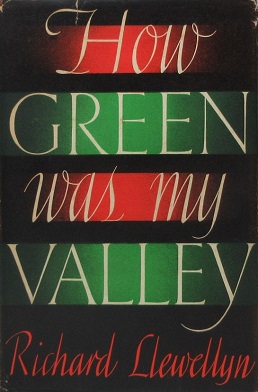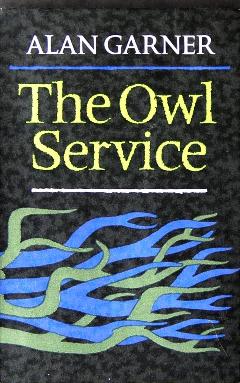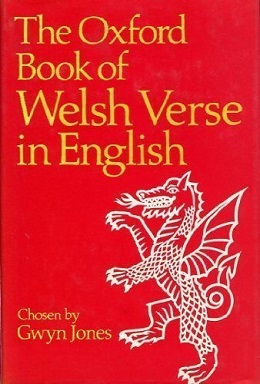Related Research Articles

How Green Was My Valley is a 1939 novel by Richard Llewellyn, narrated by Huw Morgan, the main character, about his Welsh family and the mining community in which they live. The author had claimed that he based the book on his own experiences but this was found to be untrue after his death; Llewellyn was English-born and spent little time in Wales, though he was of Welsh descent. Llewellyn gathered material for the novel from conversations with local mining families in Gilfach Goch.

The Owl Service is a low fantasy novel for young adults by Alan Garner, published by Collins in 1967. Set in modern Wales, it is an adaptation of the story of the mythical Welsh woman Blodeuwedd, an "expression of the myth" in the author's words.

The Oxford Book of Welsh Verse in English is a 1977 poetry anthology edited by the author and academic Gwyn Jones. It covers both Welsh language poetry in English translation and poetry written in English by Welsh poets.
This article is about the particular significance of the year 1975 to Wales and its people.

Ysgol Gyfun Gymraeg Glantaf is a Welsh-medium coeducational secondary school in Llandaff North, a district in the north of Cardiff, Wales; it is the largest of its kind in the country. Of the three Welsh-medium secondary schools serving Cardiff, it was the first to be established; the others are Ysgol Gyfun Gymraeg Plasmawr and Ysgol Gyfun Gymraeg Bro Edern. As of 2017, 36% of pupils came from Welsh-speaking homes.
The Tir na n-Og Awards are a set of annual children's literary awards in Wales from 1976. They are presented by the Books Council of Wales to the best books published during the preceding calendar year in each of three awards categories, one English-language and two Welsh-language. Their purpose is "[to raise] the standard of children's and young people's books and to encourage the buying and reading of good books." There is no restriction to fiction or prose. Each prize is £1,000.

C'mon Midffîld! is one of the most successful Welsh television comedy series ever broadcast on S4C. Created by Mei Jones and Alun Ffred Jones, the show started life on BBC Radio Cymru in 1982 followed by three series before being adapted for the screen by Ffilmiau'r Nant in 1988.

August is a 1996 British drama film directed by and starring Anthony Hopkins as Ieuan (IPA:j/əɨ/a/n) Davies, and featuring Rhys Ifans in a small role in one of his earliest films, as Griffiths. It is an adaptation of Anton Chekhov's 1899 play Uncle Vanya, with the character Ieuan Davies taking over the title role.

Alys is a Welsh television drama series, created by BAFTA Award-winning scriptwriter Siwan Jones and produced by Apollo and Boom Cymru. It was broadcast on Welsh-language television channel S4C from 23 January 2011 to 30 December 2012, lasting two series. The leading protagonist of the series is portrayed by Sara Lloyd-Gregory, in a role which was specially written for her. Supporting cast include William Thomas, Aneirin Hughes, Gillian Elisa, Shelley Rees, and Kate Jarman. The story revolves around a young woman who flees Cardiff, with her 10-year-old son, trying to escape her troubled past, while her dark secrets eventually begin to surface.
Gwaith/Cartref is a Welsh language television series that in set in the comprehensive school of Bro Taf, broadcast on S4C. The show was set in the Welsh valley Rhondda Cynon Taf from series one until the end of series five, and Rhymney Valley from the beginning of series six until the end of the show in series nine. The first episode was broadcast on S4C on 18 September 2011 and the final episode on 12 April 2018. Gwaith/Cartref ran for 90 episodes and almost 7 years. In 2019, the first three series were made available on S4C Clic.

"The Girls of Llanbadarn", or "The Ladies of Llanbadarn", is a short, wryly humorous poem by the 14th-century Welsh poet Dafydd ap Gwilym, in which he mocks his own lack of success with the girls of his neighbourhood. Dafydd is widely seen as the greatest of the Welsh poets, and this is one of his best-known works. The poem cannot be precisely dated, but was perhaps written in the 1340s.

"The Seagull" is a love poem in 30 lines by the 14th-century Welsh poet Dafydd ap Gwilym, probably written in or around the 1340s. Dafydd is widely seen as the greatest of the Welsh poets, and this is one of his best-known and best-loved works.

"The Wind" is a 64-line love poem in the form of a cywydd by the 14th-century Welsh poet Dafydd ap Gwilym. Dafydd is widely seen as the greatest of the Welsh poets, and this is one of his most highly praised works. Rachel Bromwich called it "one of the greatest of all his poems", while the academic critic Andrew Breeze has hailed it as "a masterpiece" and "a work of genius", noting especially its "rhetorical splendour".

Welsh folk music refers to music that is traditionally sung or played in Wales, by Welsh people or originating from Wales.
Wiliam Llŷn was a Welsh-language poet whose work largely consists of elegies and praise-poems. He is considered the last major Welsh poet of the bardic tradition, comparable to the greatest late-medieval Welsh poets, and has been called Wales's supreme elegist. Two of his poems are included in The Oxford Book of Welsh Verse.
The Oxford Book of Welsh Verse (1962), edited by Thomas Parry, is an anthology of Welsh-language poetry stretching from Aneirin in the 6th century to Bobi Jones in the 20th. No translations of the poems are provided, but the introduction and notes are in English. It was the first anthology to give the reader a thorough idea of Welsh poetry in its entirety through 1400 years, containing as it does 370 poems, of which 59 cannot be securely attributed while the rest are the work of 146 named poets. It went through eight editions in its first 21 years, and was supplemented in 1977 by the publication of Gwyn Jones's Oxford Book of Welsh Verse in English.